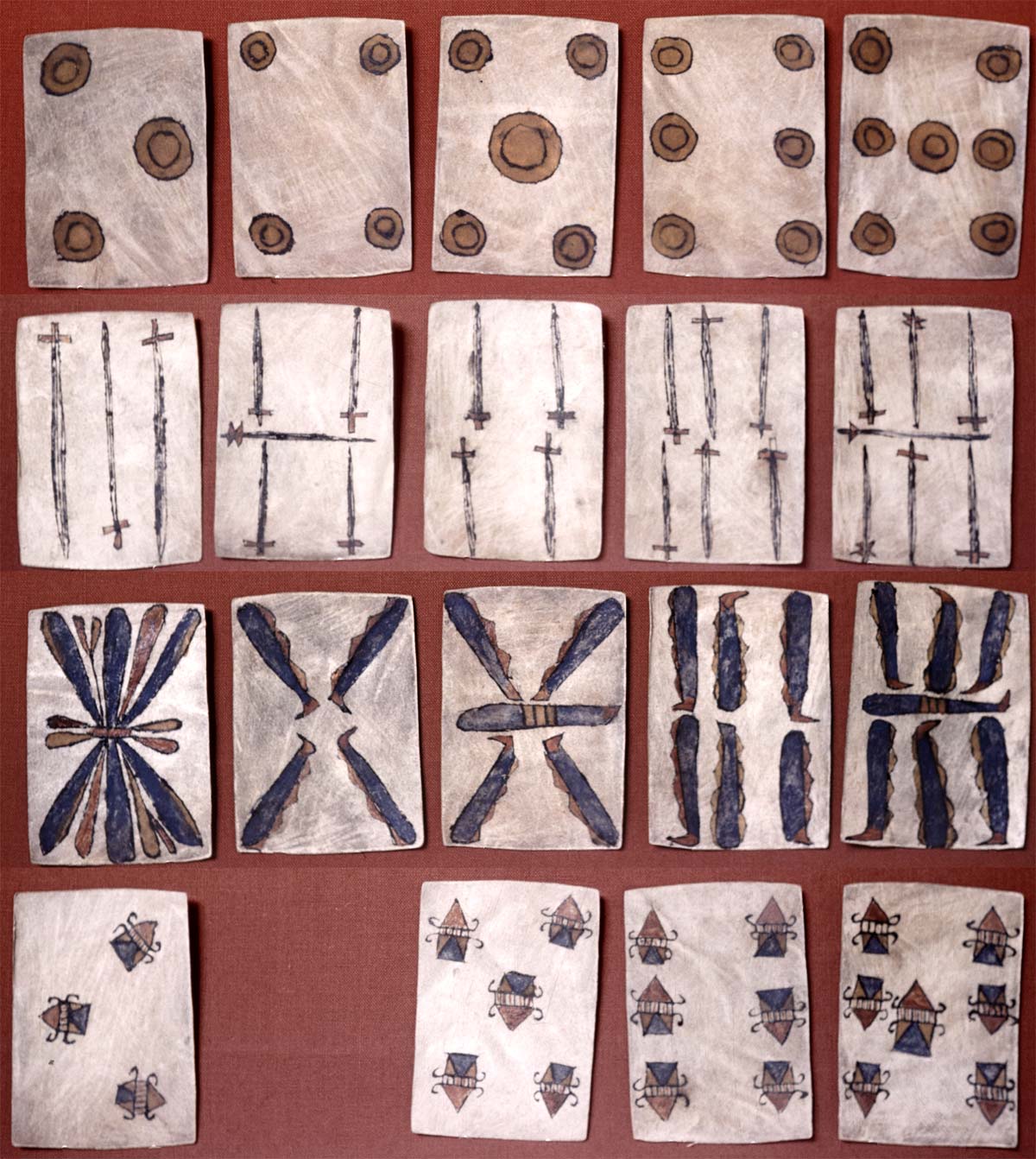Apache cards by Tonto Naipero
Apache rawhide playing cards by ‘Tonto Naipero’, c.1871.
Apaches and Chiricahuas began making their own playing cards from rawhide when paper cards made in Spain or Mexico were not available, such as during periods of hostilities or when trade was stifled. Spanish designs were imitated in traditional Apache style to create a unique folk-art genre that to Western eyes may appear somewhat bizarre. It is not known when the Apaches first started making their own cards, but the earliest surviving packs date from the 1860s after they were collected by U.S. military officers or obtained from Apache scouts or prisoners.

Above: Apache rawhide playing cards attributed to the ‘Tonto Naipero’, c.1871. 40 cards. ‘Tonto Naipero’ is the assumed author of several rawhide packs displaying stylistic similarities and attributes of which this is one example. Images courtesy of the Department of Anthropology, National Museum of Natural History, Smithsonian Institution, Washington, D.C. [Cat. no. 11079]. Photographs by Harold Wayland.
It is believed that some Apaches, perhaps prompted by sales of packs that had been made for their own use, began to make rawhide cards specifically to sell to travellers or anthropologists.
REFERENCES
Ferg, Alan, Wayland, Harold & Virginia: Recognizing a Nineteenth Century Apache Playing Card Artist: the Tonto Naipero, in ‘The Playing-card’, Journal of the IPCS, Vol.36 No.2, Oct-Dec 2007.
Wayland, Harold & Virginia, Ferg, Alan: Playing Cards of the Apaches, a study in cultural adaptation, Screenfold Press, 2006

By Simon Wintle
Member since February 01, 1996
I am the founder of The World of Playing Cards (est. 1996), a website dedicated to the history, artistry and cultural significance of playing cards and tarot. Over the years I have researched various areas of the subject, acquired and traded collections and contributed as a committee member of the IPCS and graphics editor of The Playing-Card journal. Having lived in Chile, England, Wales, and now Spain, these experiences have shaped my work and passion for playing cards. Amongst my achievements is producing a limited-edition replica of a 17th-century English pack using woodblocks and stencils—a labour of love. Today, the World of Playing Cards is a global collaborative project, with my son Adam serving as the technical driving force behind its development. His innovative efforts have helped shape the site into the thriving hub it is today. You are warmly invited to become a contributor and share your enthusiasm.
Related Articles

Rap Rummy
Rap Rummy made by Parker Brothers in 1926, only 4 years after the discovery of King Tutankhamen’s to...

German Travel Cards
A travel-themed educational deck helping American tourists visiting Germany.

Can You Believe Your Eyes?
“Can You Believe Your Eyes?” playing cards featuring visual illusions & other oddities.

Visite Mexico
Promoting Mexican tourism with 54 different photographs in full colour.

Get Decked
Black and white cartoons devised by Sam Wagner with help from artist Lindsay Bevington.

Beowulf
Jackson Robinson's Beowulf playing card deck inspired by the Old English pagan poem.

Keith Haring playing cards
Energetic graffiti images by the American artist Keith Haring.

Mexican ethnic playing cards
Mexican ethnic groups depicted on playing cards by Fábrica de Naipes Cuauhtemoc.

The Tarot of Meditation – Yeager Tarot
Marty Yeager’s original Tarot of Meditation from 1975, republished later by U.S. Games Systems, Inc....

Adobe Deck
The first digitally-produced deck of cards.

Seminole Wars deck
Seminole Wars deck by J. Y. Humphreys, Philadelphia, c.1819.

The UCR Deck
Giant-size cards designed by Thomas Sanders to advertise courses and facilities at UCR.

Fredericks & Mae playing cards
A rainbow pack from the design team of Fredericks & Mae and Benjamin English.

Red Hat Society playing cards
Society that encourages women in their quest to get the most out of life.

Mountain Dream Tarot
Groundbreaking Tarot created by Bea Nettles, using photographs and photo montage.

Junior Playing Cards
Child-friendly versions of standard English pattern cards designed by Louie Mantia, Jr.
Most Popular
Our top articles from the past 28 days





